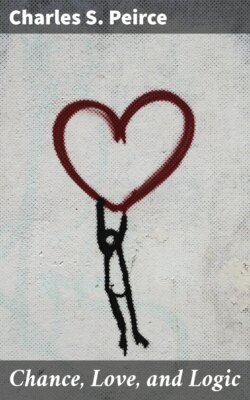Читать книгу Chance, Love, and Logic - Charles S. Peirce - Страница 9
На сайте Литреса книга снята с продажи.
PROEM
THE RULES OF PHILOSOPHY[25]
ОглавлениеTable of Contents
Descartes is the father of modern philosophy, and the spirit of Cartesianism—that which principally distinguishes it from the scholasticism which it displaced—may be compendiously stated as follows:
1. It teaches that philosophy must begin with universal doubt; whereas scholasticism had never questioned fundamentals.
2. It teaches that the ultimate test of certainty is to be found in the individual consciousness; whereas scholasticism had rested on the testimony of sages and of the Catholic Church.
3. The multiform argumentation of the middle ages is replaced by a single thread of inference depending often upon inconspicuous premises.
4. Scholasticism had its mysteries of faith, but undertook to explain all created things. But there are many facts which Cartesianism not only does not explain but renders absolutely inexplicable, unless to say that “God makes them so” is to be regarded as an explanation.
In some, or all of these respects, most modern philosophers have been, in effect, Cartesians. Now without wishing to return to scholasticism, it seems to me that modern science and modern logic require us to stand upon a very different platform from this.
1. We cannot begin with complete doubt. We must begin with all the prejudices which we actually have when we enter upon the study of philosophy. These prejudices are not to be dispelled by a maxim, for they are things which it does not occur to us can be questioned. Hence this initial skepticism will be a mere self-deception, and not real doubt; and no one who follows the Cartesian method will ever be satisfied until he has formally recovered all those beliefs which in form he has given up. It is, therefore, as useless a preliminary as going to the North Pole would be in order to get to Constantinople by coming down regularly upon a meridian. A person may, it is true, in the course of his studies, find reason to doubt what he began by believing; but in that case he doubts because he has a positive reason for it, and not on account of the Cartesian maxim. Let us not pretend to doubt in philosophy what we do not doubt in our hearts.
2. The same formalism appears in the Cartesian criterion, which amounts to this: “Whatever I am clearly convinced of, is true.” If I were really convinced, I should have done with reasoning and should require no test of certainty. But then to make single individuals absolute judges of truth is most pernicious. The result is that metaphysics has reached a pitch of certainty far beyond that of the physical sciences;—only they can agree upon nothing else. In sciences in which men come to agreement, when a theory has been broached it is considered to be on probation until this agreement is reached. After it is reached, the question of certainty becomes an idle one, because there is no one left who doubts it. We individually cannot reasonably hope to attain the ultimate philosophy which we pursue; we can only seek it, therefore, for the community of philosophers. Hence, if disciplined and candid minds carefully examine a theory and refuse to accept it, this ought to create doubts in the mind of the author of the theory himself.
3. Philosophy ought to imitate the successful sciences in its methods, so far as to proceed only from tangible premises which can be subjected to careful scrutiny, and to trust rather to the multitude and variety of its arguments than to the conclusiveness of any one. Its reasoning should not form a chain which is no stronger than its weakest link, but a cable whose fibers may be ever so slender, provided they are sufficiently numerous and intimately connected.
4. Every unidealistic philosophy supposes some absolutely inexplicable, unanalyzable ultimate; in short, something resulting from mediation itself not susceptible of mediation. Now that anything is thus inexplicable, can only be known by reasoning from signs. But the only justification of an inference from signs is that the conclusion explains the fact. To suppose the fact absolutely inexplicable, is not to explain it, and hence this supposition is never allowable.
